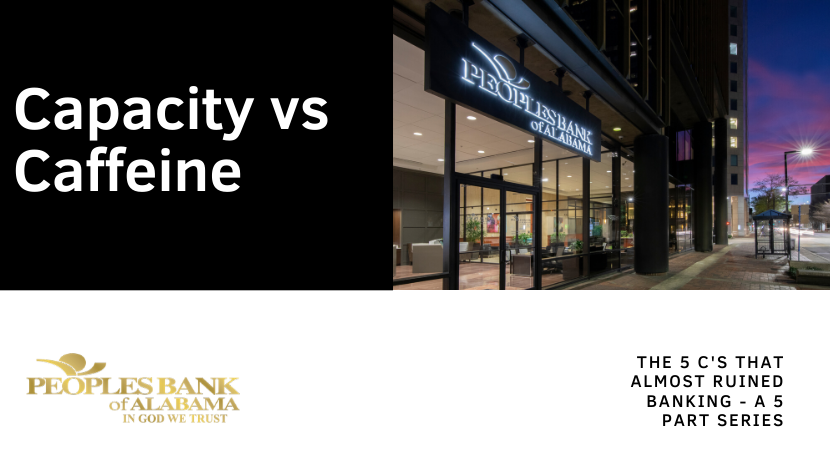The 5 C's That Almost Ruined Banking, Part 2

In part 1 of this series, I proposed that the Great Recession could partly be blamed on some banks substituting different words from the “Fundamental 5 C’s of Credit” to become the “Detrimental 5 C’s of Credit” when considering loan risk. The prior article focused on the first fundamental “C” called “Character” that I defined as “the intangible that says a borrower will do everything within his or her power to fulfill the obligation." Character is a measurement of intentionality. However, I proposed that word was replaced by a new “C” called “Camouflage” that I defined as when “lenders may have intentionally overlooked or not disclosed red flags that could have indicated potential problems later.” “Camouflage” means the skeletons stay hidden in the closet.
In part 2, we review the second “C” called Capacity vs. Caffeine.
What is "Capacity"?
Capacity refers to the borrower’s ability to repay the loan from operations. In other words, Capacity determines if the borrower generates enough cash flow to make the loan payment. We measure Capacity by “Debt Service Coverage” which is a ratio that divides the borrower’s loan payment into the cash flow available. The higher the ratio indicates a higher likelihood that the loan will be repaid.
Past or even current cash flow is not a guarantee of future cash flow. All businesses have peaks and valleys which can impact the cash available for debt service so most banks use a minimum Debt Service Coverage Ratio of 1.20:1 which means there is a 20% cash flow cushion for those rainy days. Businesses that over extend and take on more debt than their cash flow can handle put their chances of survival at risk during cash flow “valleys."
So Why "Caffeine"?
Caffeine is an external stimulant that alters your ability to function. In other words, a bank on Caffeine is likely to do something that it wouldn’t do otherwise. Caffeine is most often found where banks (due to outside influences of investor demands, competition, or even bragging rights) put their lenders under increasingly demanding loan production goals and that pressure means they have occasionally bent the Capacity calculation rules to get a loan approved. As such, loans are made with less and less cushion for “rainy days;" and unfortunately, we’ve seen the results of what happens in a “Noah-like” thunderstorm!
Sometimes business owners can fall victim to the “Caffeine” mentality as well. Growing your business too quickly because you want to out-produce or lower your sales price so you can out-sell your competition can jeopardize long term success. When a business grows too quickly, it can easily get to a place where the business spends cash faster than it collects which ultimately creates issues in operating cash flow. That’s why having a strong relationship with a banker with integrity is important. These relationships yield open and honest discussions that successfully navigate the capacity vs caffeine mentality.
Too often we "want it all and we want it all right now," but staying focused on prudent growth ensures your business’s long-term success while keeping the caffeine in the break room coffee pot.
If you are already a bank customer, thank you for your loyalty and please let us know of any ways we can help. For those looking for a trusted banking partner, we'd love the opportunity to earn your business.
